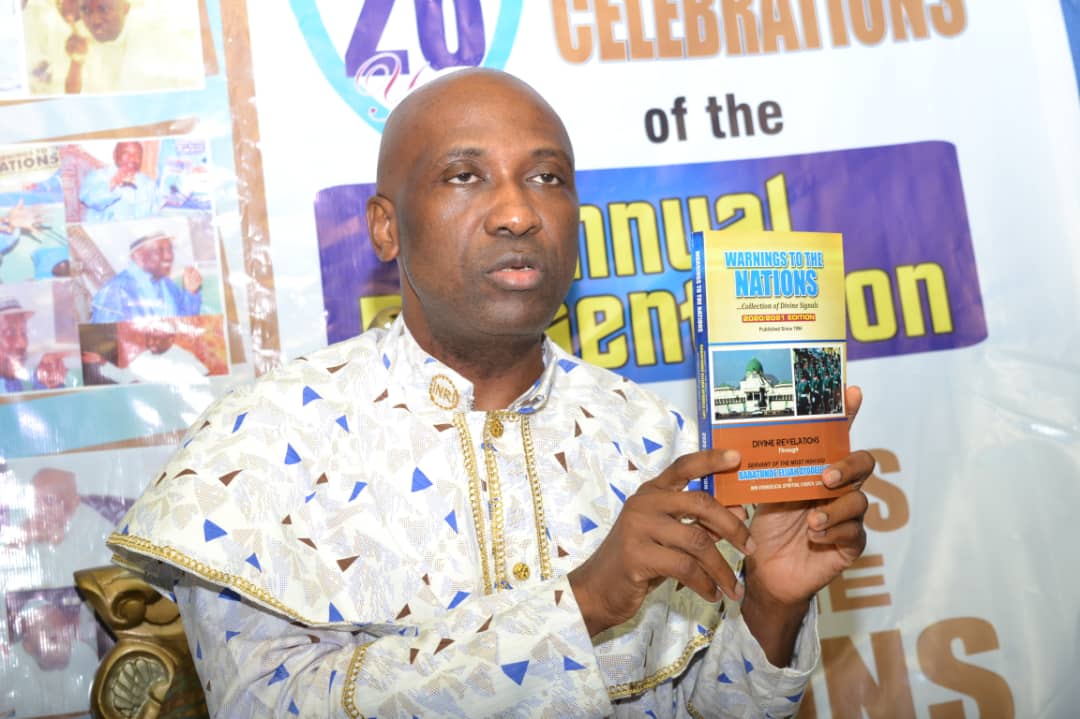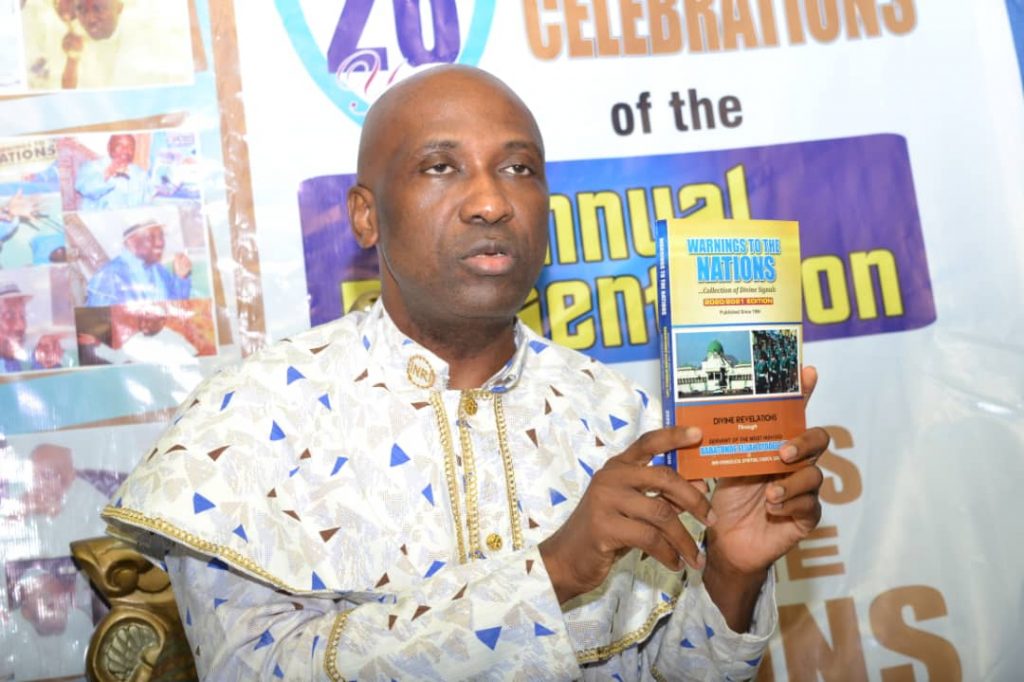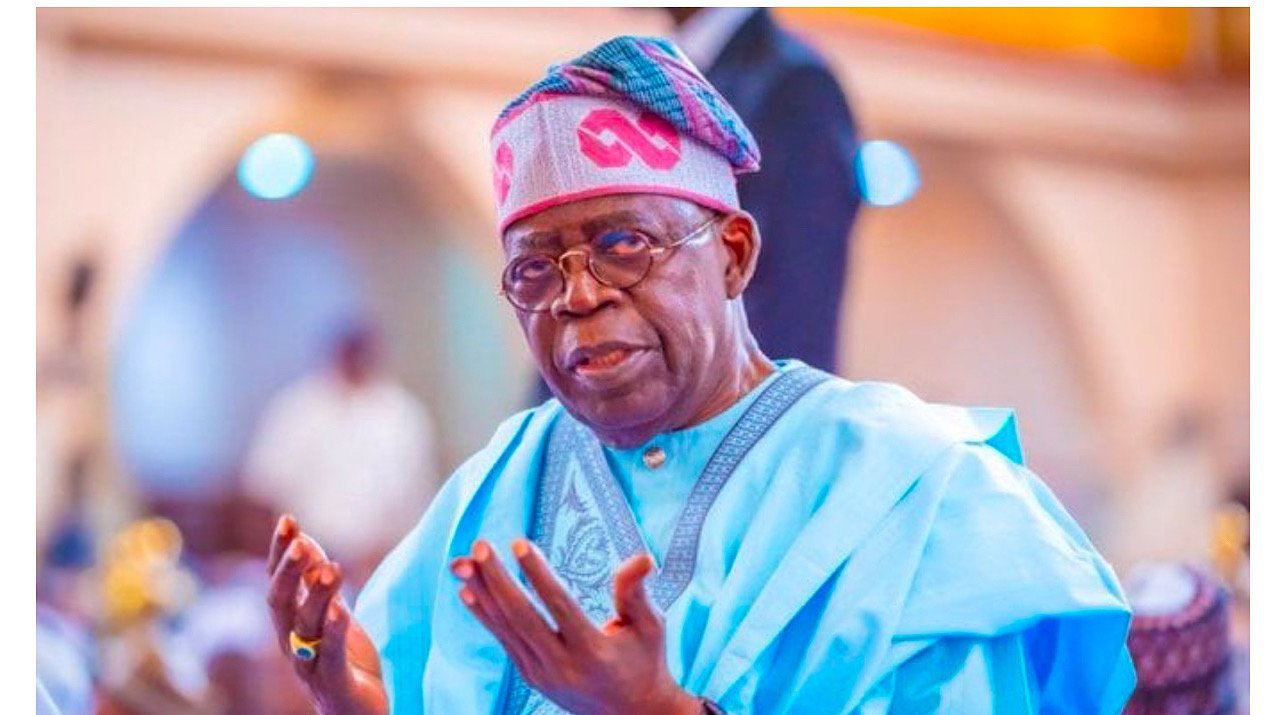news
Warning To The Nation : Primate Ayodele Sets World Record, Launches Compendium Of 10,000 Fulfilled Prophecies

 The leader of INRI Evangelical spiritual church, Primate Elijah Ayodele has set a huge world record with the simultaneous release of a compendium of more than 10,000 fulfilled prophecies and the 2020/2021 edition of his annual book of prophecy titled ‘Warning to the nations’.
The leader of INRI Evangelical spiritual church, Primate Elijah Ayodele has set a huge world record with the simultaneous release of a compendium of more than 10,000 fulfilled prophecies and the 2020/2021 edition of his annual book of prophecy titled ‘Warning to the nations’.
The event which held on Saturday, 22nd of August, 2020 in his Lagos church had dignitaries from different walks of life in attendance, it also had several media practitioners who graced the record breaking launch.
The compendium contains 10,000 fulfilled prophecies of the man of God from 1994 till date while the newly released 2020/2021 Edition of the Warning to the nations is a 376-paged book that contains divine revelations, warning, prophecies to Nations, world leaders, corporate organizations, individuals, to mention a few.
Also, the 2020/2021 Edition of WTNs is the 26th edition, which according to many, has served as a divine guidance to countries, Presidents, individuals, organizations, since its inception.
Some of the highlights of the warnings to the nations include prayers against loss of a Saudi Arabian prince, the removal of the President of Guinea, Outbreak of diseases and attacks in Sri Lanka, Monarchical problem in Spain, Problems between America and China, Hidden secrets being exposed in Nigeria Presidential Villa, Break in Nigeria, to mention a few.
While addressing the attendees, Primate Elijah Ayodele expressed gratitude to God for his continued support, strength and divine prophecies since the beginning of his ministry up till the present moment.
He explained that the release of a compendium of 10,000 fulfilled prophecies and the 26th edition of his annual book of prophecy was as a result of divine instructions from God.
‘The release of this books wasn’t borne out of my wish to show off some of my prophecies that have come to pass, it was as a result of divine instructions by God. I have been releasing ‘Warning to all Nations’ since 1994 to God’s glory and it was just an instruction I received from God.
I thank God for his faithfulness to my prophetic ministry, it’s not an easy task to have more than 10,000 prophecies fulfilled, I return all glory to God almighty’.
Furthermore, Primate Ayodele explained that warnings are meant to give individuals, nations, organizations a preview of what lies ahead of them, making it known that whenever such arises, precautions and prayers are the things needed to do.
‘As a prophet, you are required to tell people what is ahead of them because you can see beyond them as a spiritual person. Whenever you see a challenge and you tell them about it, what is required of them is take spiritual precautions and prayers.
Warnings are not to scare them, they are not to make them feel uncomfortable, they serve as an exposition of what they haven’t seen, hence, the need to take them serious
It’s unfortunate that some people don’t take the words of true prophets serious, this is also why unpalatable happenings occur, people don’t heed to warnings, which is sincerely wrong’.
It is worthy of being noted that some warnings in WTNs 2020/2021 have started coming to pass. Some of them include the Fire incident in Ooni of Ife’s palace (Pg 106), the removal of Mali’s President (Pg 162), the current unrest in Belarus (Pg 126), to mention a few.
Although the official launch was on Saturday, 22nd Of August, information revealed that it had been published months ago but due to the restrictions on gatherings, the launching was delayed.
No doubt, Primate Elijah Ayodele has proven severally that his ministry is one of its kind judging by the rate of record-breaking heights he has attained.
news
Update : Seyi Tinubu Responds to King Mitchy, VeryDarkMan Saga


Seyi Tinubu, son of President Bola Tinubu, has issued a statement debunking allegations linking him to a feud between social media personalities Martins Vincent Otse, popularly called VeryDarkMan, and Mitchell Mukoro, widely known as King Mitchy.
The controversy stems from claims suggesting an improper relationship or secret arrangements between Seyi Tinubu and King Mitchy, which VeryDarkMan has reportedly used to intensify his online narrative.
Our correspondence reports that philanthropist and content creator King Mitchy recently announced that she renovated a dilapidated school in six days, suggesting that the project was proof that meaningful change could happen swiftly when there was genuine intent.
However, she reportedly made comments widely interpreted as subtle jabs at VeryDarkMan, who, in turn, accused her of being used as a political pawn to launder the image of President Bola Tinubu’s administration.
Tagging the President’s son. VeryDarkMan was said to have alleged in another video that both Seyi Tinubu and King Mitchy were threatening his life.
Addressing the comments in a statement shared on Instagram on Saturday, Seyi Tinubu categorised the allegations and insinuations as false.
He clarified the nature of his interaction with King Mitchy, framing it strictly within the bounds of his long-standing philanthropic work.
Tinubu wrote, “I met Mitchy once, in a public setting, alongside others. On that occasion, I provided financial support toward her NGO activities, just as I have supported many young Nigerians and organisations working to empower our people.
“A follow-up meeting had been scheduled for me to receive an update on the impact of her NGO’s work following the donation. That meeting did not take place because I have been unwell.”
He categorically denied any private encounters, saying, “There has never been a private encounter, no secret arrangement, and no impropriety of any kind.”
Tinubu took direct aim at VeryDarkMan, accusing the activist of using a feud he had no part in to attack his reputation.
He wrote, “What is deeply concerning is that a feud I did not start, and in which I have played no part, has been used as a vehicle to insert my name into a narrative without basis in truth.
“For reasons best known to him, VDM appears to have been looking for a trigger, an opportunity to attack and attempt to harm my reputation and seized upon this situation to do so. I will not accept that.
“If my name generates attention, let us at least deal in facts. Supporting charitable causes is not a crime. Meeting someone publicly to support their NGO is not a scandal. Repeating falsehoods loudly does not transform them into truth.”
Tinubu asserted that he won’t be intimidated by “fictional” narratives, emphasising that he refuses to be bullied.
“I will not be bullied, and I will not dignify fiction with panic.
“I have experienced bullying before, and I understand the harm it can cause. That is why I take a firm stance against it,” he said.
Tinubu concluded by reaffirming his commitment to serving Nigerian youth through his foundation, insisting that “philanthropy and outreach must never be politicised or weaponised.”
“To those seeking to manufacture controversy: Nigeria needs builders, not bullies. We need responsible discourse, not sensationalism driven by speculation.
“I firmly reject the accusations made against me. I call for de-escalation, for restraint, and for a return to truth and responsibility,” he added.
news
Security Reform: Tinubu Calls for Urgent Constitutional Backing for State Police


…raises fresh alarm over terrorism, banditry at State House Iftar
…Akpabio pledges more support, vows no executive bill will die in Senate
President Bola Ahmed Tinubu on Wednesday night formally urged the Senate to begin the process of amending the 1999 Constitution to provide for the establishment of state police, declaring that Nigeria must urgently restructure its security architecture to confront terrorism, banditry and insurgency.
Speaking at an interfaith breaking of fast with the leadership and members of the Senate at the State House, Abuja, the President said the time had come for lawmakers to “start thinking” about embedding state policing in the Constitution to enable governments at subnational levels better secure their territories.
“Nigeria is extremely challenged, we are facing terrorism, banditry, insurgency, but you never failed to make a right response to these calls. What I will ask for tonight is for you to start thinking how best to amend the Constitution to incorporate the state police for us to secure our country, take over our forests from marauders, free our children from fear”, Tinubu said.
The President’s latest appeal adds momentum to a campaign he has sustained since early in his administration.
In February 2024, during an emergency meeting with the 36 state governors at the State House, Tinubu approved the creation of a joint committee of federal and state representatives to explore modalities for establishing state police, insisting that the country must “move aggressively” to improve security of lives and property.
He renewed the call in November 2025, urging the National Assembly to begin reviewing relevant laws to allow states willing to establish their own policing structures to do so.
At the APC National Caucus meeting in December 2025, he again pressed governors and lawmakers to back constitutional reforms for state police and local government autonomy.
Only days ago, at an interfaith breaking of fast with governors at the Presidential Villa, the President declared that state police “can’t wait” and “will not be postponed,” urging preparations for what he described as a necessary shift in the nation’s security architecture.
At Wednesday’s gathering with senators, Tinubu framed the proposed reform as a constitutional obligation anchored on unity and shared responsibility.
“What you have faced in the challenging period of this country, the terrorism and banditry, is causing us havoc and we should pull together, unite in a way that our forefathers contemplated to bring about a constitutional democracy and pull us together. They didn’t say we should fight,” he said.
Beyond security, the President expressed deep appreciation to lawmakers for supporting what he described as bold and necessary economic reforms.
“I have a lot of credit for bold reforms. Without your collaborations, without your inspirations, those reforms are not possible. We are reformists together,” he said.
Tinubu defended the removal of petrol subsidy and foreign exchange reforms, describing them as steps taken to halt “monumental corruption.”
“What we gave up and what we stopped is a monumental corruption in subsidy. We gave it up. We don’t want to participate in monumental corruption, in arbitrage, foreign exchange,” he stated.
‘Amend Constitution to accommodate state police’
State police and questions Nigeria can no longer avoid
Senate backs state police, technology-driven reforms to boost Nigeria’s security
According to him, the reforms have laid the foundation for economic stability.
“You don’t have to chase me for dollars. In the past, you could see what Nigeria is today. You should be proud… What we are enjoying is stable economy, prosperity beckoning on us. We just need to work hard for it,” he added.
Responding to criticisms from political opponents, the President dismissed claims that he was stifling opposition voices.
“When they accused me of killing oppositions, I didn’t have a gun… I can’t blame anybody from jumping out of a sinking ship if they did,” he said, in apparent reference to recent defections.
He described the coincidence of Ramadan and Lent as symbolic of national unity and called for continued harmony between the executive and legislature.
“We are committed to Nigerian entity succeeding. We are committed to make law for the welfare, prosperity of the country. I think we are committed together to govern together,” he said.
In his response, President of the Senate, Senator Godswill Akpabio, assured the President of the chamber’s loyalty and continued cooperation.
“We have nothing to give to you than to assure you of our loyalty,” Akpabio said. “I’m sure you have noticed that nothing you have ever sent to us died in first reading, and it will never happen.”
He said the Senate painstakingly reviews executive proposals to ensure they serve national interest, even when they initially attract criticism.
“We sit down to painstakingly go through everything that comes before us, and then at the end, we see that it is in the interest of Nigerians, even when the social media is not seeing it,” he said.
Akpabio commended Tinubu’s tax reforms, foreign exchange unification, fuel subsidy removal and the recent electoral amendment, noting that the President promptly assented to the revised Electoral Act when convinced it served national interest.
He expressed optimism that by 2031, Nigeria would be more prosperous under Tinubu’s leadership and offered prayers for peace amid what he described as “troubles and sponsored insecurity” in parts of the country.
The Senate President also thanked Tinubu for appointing former Senator Jimoh Ibrahim as an ambassador, describing it as recognition of legislative talent.
The interfaith gathering ended with prayers for unity, wisdom and strength for the nation’s leaders as they navigate security and economic challenges.
news
BREAKING: Tinubu Names Tunji Disu Acting Inspector General After Egbetokun’s Exit


President Bola Tinubu has accepted the resignation of the Inspector-General of Police, Kayode Egbetokun, and approved the appointment of Tunji Disu as Acting Inspector-General of Police with immediate effect.
Our correspondent had earlier reported that Egbetokun tendered his resignation letter on Tuesday, citing pressing family considerations.
Appointed in June 2023, Egbetokun was serving a four-year term scheduled to conclude in June 2027, in line with the amended provisions of the Police Act.
In a statement issued on Tuesday by his Special Adviser on Information and Strategy, Bayo Onanuga, the President received the letter earlier on Tuesday and expressed appreciation for his service to the nation.
He also commended Egbetokun’s “decades of distinguished service to the Nigeria Police Force and the nation,” acknowledging his “dedication, professionalism, and steadfast commitment to strengthening internal security architecture during his tenure.”
“In view of the current security challenges confronting the nation, and acting in accordance with extant laws and legal guidance, President Tinubu has approved the appointment of Assistant Inspector-General of Police Tunji Disu to serve as Acting Inspector-General of Police with immediate effect.
“The President is confident that AIG Disu’s experience, operational depth, and demonstrated leadership capacity will provide steady and focused direction for the Nigeria Police Force during this critical period,” the statement read.
It added that in compliance with the provisions of the Police Act 2020, the President will soon convene a meeting of the Nigeria Police Council to formally consider Disu’s appointment as substantive Inspector-General of Police, after which his name will be forwarded to the Senate for confirmation.
The President reaffirmed his administration’s commitment to enhancing national security, strengthening institutional capacity, and ensuring that the Nigeria Police Force remains professional, accountable, and fully equipped to discharge its constitutional responsibilities.
-

 news5 years ago
news5 years agoUPDATE: #ENDSARS: CCTV footage of Lekki shootings intact – Says Sanwo – Olu
-

 lifestyle6 years ago
lifestyle6 years agoFormer Miss World: Mixed reactions trail Agbani Darego’s looks
-

 health5 years ago
health5 years agoChairman Agege LG, Ganiyu Egunjobi Receives Covid-19 Vaccines
-

 lifestyle4 years ago
lifestyle4 years agoObateru: Celebrating a Quintessential PR Man at 60
-

 health6 years ago
health6 years agoUPDATE : Nigeria Records 790 new cases of COVID-19
-

 health6 years ago
health6 years agoBREAKING: Nigeria confirms 663 new cases of COVID-19
-

 entertainment1 year ago
entertainment1 year agoAshny Set for Valentine Special and new Album ‘ Femme Fatale’
-

 news9 months ago
news9 months agoBREAKING: Tinubu swears in new NNPCL Board


